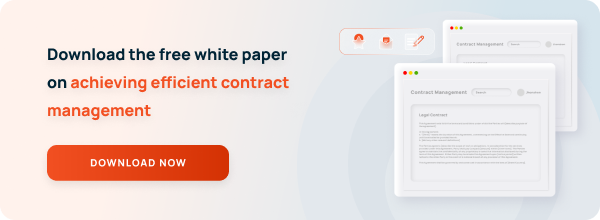
Role and Importance of Contract Managers Increases

Imagine running a business where every contract is a critical piece of the puzzle. Now imagine trying to manage hundreds of contracts without a plan—frustrating, right?
Ineffective contract handling can significantly reduce an organization’s profitability and efficiency. That’s why contract managers are important.
What is a contract manager?
A contract manager is like the "superhero of agreements"—they manage deadlines, making sure each contract is executed and delivered, and all parties stick to their promises, maintaining your business free from contract chaos!
What does a contract manager do?
As companies outsource more and work with more international companies, a streamlined system led by a productive contract manager is important for managing external suppliers, creating better documentation that crosses cultural and linguistic differences, and staying ahead of local, state, national, and international regulations.
In addition, contract management managers need to balance the legal and business aspects of the position as leadership asks them to be more involved in the business side and coordinate with the procurement, sales, accounting and finance and compliance departments.
Why is a contract manager important for your organization?
Without committed, experienced contract managers, it’s virtually impossible to have an efficient contract management system, whether your organization relies on Contract Management Software or not.
From contract requests and creation through execution and renewal management, the importance of the contract manager role is ensuring contracts make it through every step of the process, contractual obligations are met, clients and vendors are kept happy and contracts remain profitable for the company.
Contract Management Software supports contract managers mitigate risks and helps them automate these processes, and it’s the contract managers’ job to maximize the software’s capabilities as their role becomes increasingly important.
A recent webinar hosted by the International Association for Contract & Commercial Management highlighted “five growing risks that justify the need” for dedicated contract managers and an efficient system:
(1) growing dependence on third parties
(2) increased regulations and stricter compliance standards
(3) internationalism
(4) the need for more executive leadership oversight
(5) and greater coordination and collaboration amongst a company’s departments.
Also read: Learn 7 Things that will Change the Way you Approach Contract Management
What are the roles and responsibilities of a Contract Manager?
A contract manager plays a vital role in tracking the entire contract lifecycle, to ensure compliance, mitigate risks, and facilitate smooth contract negotiations for organizational success.
Here is the role of a contract manager in the contract management process:
Contract Creation
A contract manager is responsible for drafting each contract that meets the organization’s objectives to ensure legal compliance. They work with internal teams to collect necessary details, define contract terms, and ensure accuracy before execution.
Risk Management
One of the key roles of a contract manager is to identify potential risks in contract agreements. They evaluate terms to minimize any financial, legal, or operational risks, ensuring the company is not exposed to unnecessary liabilities.
Negotiation
Contract managers negotiate with vendors, clients, and partners to secure profitable terms. They develop a balance between sustaining the organization's reputation and protecting its interests, ensuring that agreements are favorable to all parties.
Compliance Assurance
The most critical responsibility of a contract manager is to ensure that all contracts comply with company policies, industry regulations, and legal requirements. They stay updated on laws and ensure all agreements align with those standards.
Contract Lifecycle Management
From the initial phase to the renewal phase, a contract manager must manage the entire contract lifecycle. They track deadlines, monitor performance, and make sure that all parties fulfill their contractual obligations promptly.
Collaboration with Stakeholders
Contract managers act as a bridge between departments like legal, finance, procurement, and sales. They verify all stakeholders are aligned and informed throughout the contract process to improve communication.
Data Management and Reporting
Contract managers also provide regular reports on contract performance and renewals and keep a record of all contract-related documents, helping organizations stay on top of their contract portfolios.
Issue Resolution
Contract managers assist in quickly and efficiently resolving disagreements or contract breaches, minimizing delays, and protecting the business's interests.
Continuous Process Improvement
A contract manager continuously reviews and improves contract processes, implementing best practices to enhance efficiency and ensuring the organization’s contract management system is operating at its best.
Also read: Develop Contract Processes that Encourage Delegation
With all these responsibilities in mind, what does a good contract manager's role look like?
They must combine a working knowledge of current regulations, laws, compliance issues, industry standards, and company policies with contracting concepts to be able to draft and review contracts.
Strong business acumen is required so they can evaluate contract requests and a contract’s value to the organization, and be able to negotiate with clients and vendors while maintaining the business relationship.
The contract manager's role is to track contractual obligations, ensuring reports and invoices are submitted accurately and on time. They prepare reports that analyze a contract’s performance and then determine how to proceed when a contract is up for renewal or expiration.
With a deep understanding of contract manager roles and responsibilities, they play a crucial role in ensuring streamlined and successful contract processes. As businesses navigate complex contractual landscapes, the role of the contract manager demonstrates the need for a skilled and proactive approach in the ever-evolving field of contract management.
ConvergePoint Contract Management Software: The Smart Choice for Contract Managers
While good contract managers must have great organization and communications skills and know how to drive the contract process, Contract Management Software, such as the one offered by ConvergePoint, can help expedite their processes. The software can help prioritize contract requests and approvals, produce ad hoc reports, track contracts’ statuses in real-time, send automated alerts about contractual obligations, renewals, and expirations, and more.
Looking for guidance on how to improve your current contract management system?
Request a demo today and learn how ConvergePoint’s Contract Management Software can help contract managers streamline their workflow and maximize efficiency at every stage.





